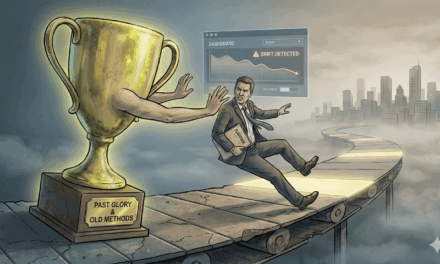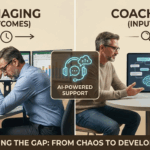
Use AI to Spark Curiosity, Not Kill It

AI is making sales worse. There’s a massive over-rotation to doing things ‘at scale’ that’s propped up by evidence that it works. But just because something works sometimes, doesn’t mean it’s the right path. Case and point: look at your inbox.
We are all missing the point
I know there’s an argument for how important relationships are in sales, but let’s be real, relationships built on lies are going to end. So no, you did not “come across my profile” and even the well written ones that are less detectable, are disingenuous unless it’s made explicitly clear it came from an AI.
Beyond my own opinions on AI SDRs, the buying experience is objectively worse than it has ever been and AI is to blame, it’s not just top-of-funnel.
It just sounds so good on paper. “AI is going to make us faster, more efficient, more data-driven. It’s going to completely change how we sell.”
Everybody is missing the point.
When AI is used to take over human interactions, it turns sales into something cold and transactional. It wipes out the ability to earn the right to explore together.
The thing is, we have fallen head over heels with the idea of efficiency. “Do more with less” has been the mantra of the last 4 years and when we were done laying people off (for the most part), we moved onto automating our way to capital efficient growth.
Simply put, we have forgotten that sales isn’t actually about efficiency, it’s not about speed, it’s about understanding your buyer and their challenges, and to understand, you have to be curious.

We have allowed AI to take over tasks that should be driven by human curiosity, and it’s literally incapable of doing it. Instead of using AI to enhance our ability to be human, we are becoming robots.
Sales is not about ticking boxes. That’s why you have a bell curve. That’s why even the world’s greatest sales methodology and frameworks won’t make every single rep successful. As much as we hate to admit it, there’s still a lot of art involved.
Sales is human, it always has been and it always will be.
To be good in this industry, you have to be relentlessly curious, you have to ask smart, thoughtful questions, listen to the responses and take the conversation from there.
But instead of helping us do those very hard things better, AI is being deployed to automate shallow actions and often do so badly.
I started this article by saying AI has made sales worse, but it has the capability to actually make us better human beings. AI can help us be way more effective at the human components if we just think of it that way around – making us better, not taking things from us. Everybody is chasing short term gains instead of using this phenomenal technology to dig deeper. It’s time to change that.
Now for the good stuff…
Noticed how LLMs love the phrase ‘game-changer’? Well, AI really can be the driver of change that we need, if focused on the right areas. Here’s the world I want to see:
1. AI should be a back-office tool
Any task that you do, that doesn’t require independent thought and is repetitive in nature, is ripe for AI. We have already seen this take hold with things like automating meeting notes and updating CRMs and can expect to see a lot more of this as the major players roll out their offerings.
If creativity and emotional intelligence aren’t required and it’s not client-facing, we can offload these tasks to AI to create time for actually engaging with our buyers, learning about their needs, and helping them succeed.
2. Focus on research, not outreach
One of the best applications of AI is to make us smarter. AI can process huge amounts of data and educate us on our buyers, their industries, our competitors, pretty much anything you would want to know.
I’m not talking about scraping a LinkedIn profile and creating a smart quip about where a buyer went to college. I’m talking about market trends, industry shifts, and buyer behaviors. The more up-to-speed you are on your buyers’ world, the better placed you are to actually help.
Think of it like a doctor processing patient history, family history, imaging data, heart rate data and anything else they can get their hands on before attempting to diagnose the patient.
3. The actual home of ‘at scale’
The nuance here matters, outreach before AI was good. Training and enablement before AI was… not. The only thing that needs scale is how we improve at our jobs.
AI gives the option to personalize learnings, provide feedback on every single customer interaction, be constructive in criticism, set a uniform standard across an organization.
It can get us off the webinars, out of the classroom, and into high-context learning that makes us smarter, sharper and more effective salespeople than ever before.
4. Make us better listeners
No two people are the same, so the obsession over talk time, talk ratio, and tonality as a uniform basis for analysis is, in my opinion, floored. It’s also indicative of our obsession with ourselves, not our buyers.
AI should be able to review your calls and flag moments when buyers hesitate or lean in that you may have missed and could’ve used to ask a question and probe deeper. The more you review this kind of data, data about the buyer not you, the more you can learn to serve them better, which is what it’s all about.
5. Bye bye silos
Perhaps the biggest issue internally in any organization, is sales, marketing and product operating in their own silos with different ideas about who the company serves.
Think back to #2 on this list and now imagine that wealth of highly relevant information pairing up with internal data and being pumped around the business, serving as the beating heart of the organization’s knowledge. In a totally non-sentient non-skynet kind of way.
Everybody speaks the same language, working off a common source. No more silos.
Conclusion
AI will change sales, but whether it’s for better or worse depends on how we use it. Use AI to make you more human, more curious, more connected to your buyer.



































